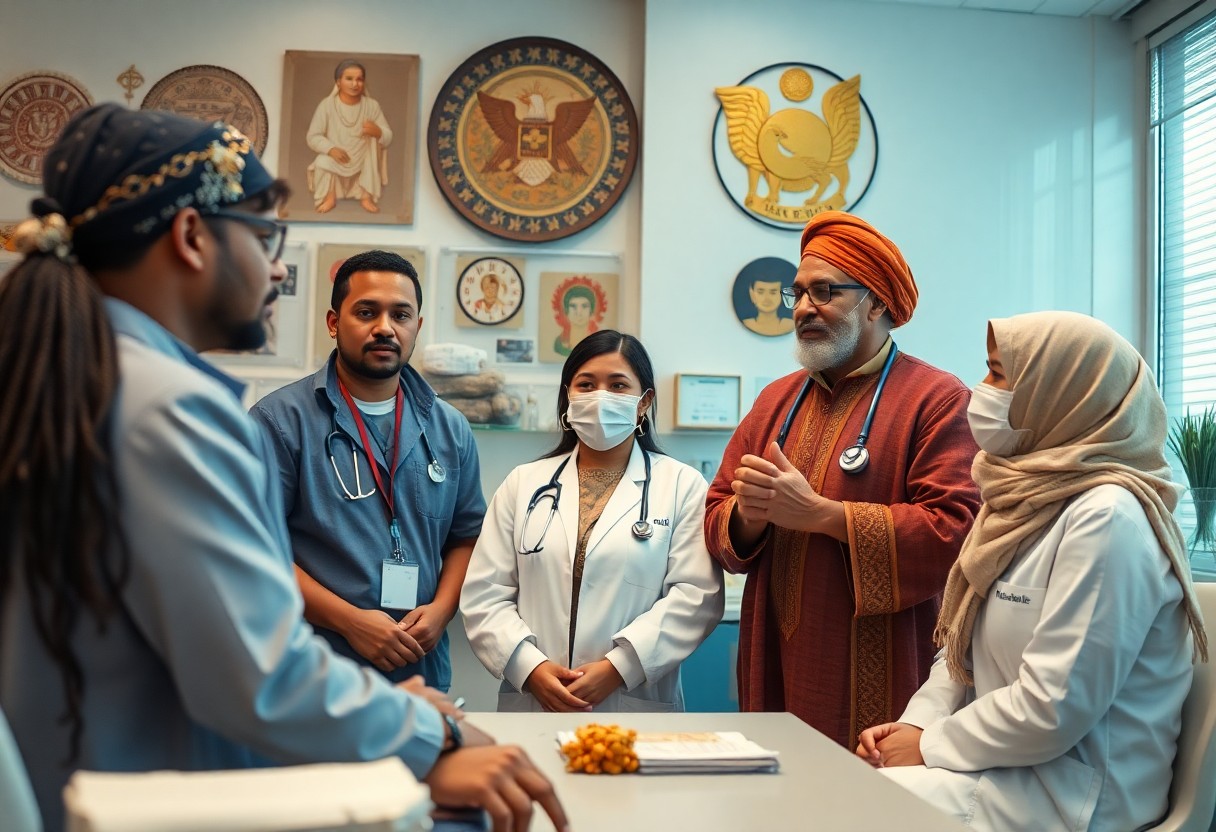Just as your background influences your personal outlook, cultural practices significantly shape healthcare approaches worldwide. In understanding global health trends, you will discover how traditions, beliefs, and values impact health behaviours and access to care. This exploration not only reveals the positive aspects of diverse practices but also highlights potential dangers that can arise from cultural misconceptions. By engaging with these intricate connections, you can gain a deeper insight into how healthcare systems can be tailored to fit various cultural contexts, ultimately improving health outcomes.
Understanding Global Health Trends
While the landscape of global health evolves, it’s imperative to grasp how various factors influence healthcare practices. These trends are shaped by demographic shifts, technological advancements, and the emergence of new diseases, ultimately impacting how populations respond to health challenges. Paying attention to these elements allows you to stay well-informed about the broader implications for health management worldwide.
Factors Influencing Health Trends
Across the globe, several factors significantly affect health trends:
- Demographics
- Economical Status
- Technological Innovations
- Environmental Changes
Any of these elements can drastically shift health outcomes, necessitating your awareness of their interconnectedness in shaping effective healthcare approaches.
Importance of Cultural Context
Health is deeply intertwined with cultural practices, beliefs, and values, influencing individuals’ perceptions of wellbeing. Understanding these cultural nuances helps you appreciate varied healthcare approaches and encourages better communication between healthcare providers and patients. The incorporation of culturally sensitive strategies leads to improved health outcomes and enhances the efficacy of interventions across diverse populations.
To navigate global health effectively, you must recognise that cultural context is a key determinant in shaping health behaviours and practices. By understanding local customs and traditions, you can facilitate more engaging and effective health communications. Additionally, being aware of cultural stigmas associated with certain conditions can prevent misunderstandings and foster a more inclusive healthcare environment. Ultimately, your awareness of these cultural dimensions enables you to promote public health initiatives that respect and align with community values.

Cultural Practices and Healthcare Approaches
One of the fundamental aspects of healthcare is the influence of cultural practices, which significantly shape how communities perceive health, illness, and treatment. By understanding these cultural frameworks, you can appreciate the diverse methods of healthcare delivery across the globe. In many regions, local customs and traditions dictate health-seeking behaviours, demonstrating how integral culture is in promoting better health outcomes.
Traditional Healing Systems
Traditional healing systems stem from longstanding cultural practices that have been passed down through generations. These methods often involve holistic approaches, considering not just physical ailments, but also emotional and spiritual well-being. You may find that in many cultures, local healers play a pivotal role, relying on herbal remedies, rituals, and community involvement to facilitate healing.
Influence of Religion and Beliefs
Above all, religious beliefs and practices profoundly influence healthcare approaches in various cultures. Your understanding of a community’s religious values can provide insight into their health behaviours and treatment options.
Also, the impact of religion can be both positive and negative in healthcare. On the one hand, strong beliefs can encourage individuals to seek treatments consistent with their faith, fostering a sense of community support and shared healing. On the other hand, some religious beliefs might lead to the rejection of conventional medical treatments, posing serious risks to health outcomes. Furthermore, certain religions emphasise the importance of prayer and faith healing, which can be beneficial for mental well-being but may not always address the physical symptoms effectively. Thus, understanding these influences helps you navigate the complex landscape of global health practices.
Case Studies in Cultural Impact
Now, numerous case studies highlight the significant influence of cultural practices on healthcare methods globally. Consider the following examples:
- 1. In Japan, traditional kami beliefs affect mental health recovery approaches.
- 2. In Kenya, the combination of herbal medicine with modern treatment has improved patient outcomes by 30%.
- 3. Indigenous Australian communities using songlines in healthcare have seen a reduction in chronic disease rates.
- 4. The Ayurvedic practices in India have demonstrated a 40% increase in holistic health satisfaction.
Eastern vs. Western Medical Practices
Any analysis of Eastern and Western medical practices reveals stark contrasts; Eastern traditions typically emphasise holistic care and balance, whereas Western approaches often prioritise biomedical interventions and technology. The differing philosophies shape patient experiences and expectations in profound ways.
Indigenous Healthcare Models
One example of effective Indigenous healthcare is the community-led initiatives in Canada, where traditional healing methods are interwoven with standard medical practices, providing more culturally relevant care.
But such models are not without their challenges. Indigenous populations often face systemic barriers, leading to health disparities. However, integrating traditional healing with modern medicine has shown remarkable outcomes; for instance, communities report a 50% improvement in patient compliance and satisfaction. These models underscore the potential of culturally competent care in enhancing health outcomes and fostering trust within communities.
The Intersection of Globalization and Local Culture
To understand healthcare today, you must explore how globalization interacts with local cultural practices. As healthcare systems evolve, they increasingly recognise that Recognizing the Importance of Cultural Competence in … is vital for providing effective care. This fusion of global influences and local traditions influences not only treatment modalities but also patients’ perceptions of health and wellbeing in diverse communities.
Hybrid Healthcare Systems
Between global standards and local cultural beliefs, hybrid healthcare systems emerge, integrating traditional methods with modern medical practices. Such systems can enhance access to care while ensuring that treatments resonate with communities, ultimately leading to improved health outcomes.
Challenges of Cultural Integration
One significant challenge you may encounter is the integration of diverse cultural practices into existing healthcare frameworks. This often results in tensions, as differing beliefs around health and illness can conflict with standard medical approaches.
In fact, addressing these challenges is imperative, as failure to do so can disrupt communication and lead to misunderstandings between healthcare providers and patients. Lack of integration can result in poorer health outcomes, while a lack of mutual respect for cultural practices may erode trust in healthcare systems. To foster effective care, you must advocate for open conversations that acknowledge and appreciate cultural diversity, paving the way for better cooperation and patient satisfaction.

Policy Implications for Healthcare Providers
Unlike traditional frameworks that overlook cultural nuances, healthcare policies must adapt to reflect diverse cultural practices. This shift requires you, as a healthcare provider, to engage in ongoing training and awareness programmes aimed at understanding the cultural contexts that influence patient care. By incorporating these insights into policy-making, you can improve healthcare delivery and ensure that it aligns better with the needs of various communities.
Culturally Competent Care
Culturally competent care entails recognising and respecting your patients’ cultural backgrounds, beliefs, and practices. By enhancing your understanding of these elements, you can provide tailored healthcare services that improve patient satisfaction and outcomes. This approach not only fosters trust but also empowers patients to actively participate in their own health decisions.
Strategies for Effective Communication
About establishing effective communication in healthcare settings, it is important to bridge cultural differences and linguistic barriers. Utilising interpreters, culturally relevant educational materials, and active listening techniques can significantly enhance your interactions with patients. These strategies create an environment where patients feel valued and understood.
Implications of employing effective communication strategies encompass recognising cultural differences and adapting your communication style accordingly. You may encounter language barriers as well as varied health beliefs and practices. Addressing these can lead to improved treatment adherence and patient satisfaction. Incorporating training on effective communication techniques will enable you to foster a more inclusive environment, thereby enhancing patient outcomes and ensuring that healthcare is both accessible and equitable.
Future Directions in Global Health
For the future of global health, embracing the diverse cultural contexts of communities will be pivotal. As healthcare systems evolve, there will be increasing recognition of the need to integrate local traditions and practices into mainstream healthcare. This approach not only fosters trust but also enhances the efficacy of health interventions, paving the way for more inclusive and effective healthcare strategies globally.
Innovations in Culturally-Informed Care
Below are several promising innovations emerging in culturally-informed care, such as the development of culturally tailored health programmes and the incorporation of traditional healers into formal health systems. These adaptations aim to respect and integrate diverse cultural beliefs, ultimately leading to enhanced patient engagement and better health outcomes.
The Role of Education and Training
Directions for the role of education and training in global health highlight the necessity of equipping healthcare professionals with a deep understanding of cultural sensitivities. Training programmes should focus on cultural competence, emphasising awareness and respect for diverse beliefs and practices. Enhanced education will enable you to deliver care that is not only clinically effective but also resonates with your patients’ cultural backgrounds, fostering an environment of trust and respect.
Understanding the role of education in global health is vital for improving health outcomes. By focusing on cultural competence, healthcare providers can navigate the complexities of diverse populations more effectively. Training should encompass real-life scenarios that enable you to address various cultural beliefs and practices, ensuring that care is not just effective but also empathetic. Promoting cultural awareness is necessary, as it empowers you to build stronger, more trusting relationships with patients, ultimately leading to better adherence to treatments and improved healthcare experiences.
Summing up
Hence, as you navigate the complexities of global health trends, it becomes evident that cultural practices significantly influence healthcare approaches. Understanding how these cultural nuances affect health behaviours, perceptions, and methodologies is vital for you to develop effective strategies in promoting health and wellbeing. By embracing diverse cultural perspectives, your engagement in healthcare can be enriched, leading to more holistic and inclusive solutions that cater to the needs of various communities worldwide.
FAQ
Q: How do cultural practices influence health beliefs and behaviours in different communities?
A: Cultural practices play a significant role in shaping health beliefs and behaviours within communities. These practices are often derived from historical traditions, religious beliefs, and social norms. For instance, some cultures may prioritise herbal remedies and traditional healing methods over modern medical practices. This can lead to varying attitudes towards healthcare professionals and treatments, affecting how individuals approach illnesses and health maintenance. Understanding these cultural nuances is important for healthcare providers to engage effectively with diverse populations, ensuring better health outcomes and fostering respect for different approaches to wellness.
Q: What is the importance of integrating cultural competence in global health initiatives?
A: Integrating cultural competence into global health initiatives is vital for the success of these programmes. By recognising and valuing the diverse cultural contexts of the populations they serve, health organisations can tailor their strategies to meet the unique needs and preferences of different communities. This approach enhances communication, builds trust, and encourages community participation in health interventions. Furthermore, culturally competent initiatives can lead to improved adherence to health recommendations, thus maximising the effectiveness of global health efforts and ultimately promoting better health equity
Q: In what ways can cultural practices affect the implementation of public health policies?
A: Cultural practices can significantly impact the implementation of public health policies in various ways. For example, community acceptance of vaccination programmes may be influenced by cultural beliefs surrounding immunisation. If a community harbours scepticism towards vaccines due to historical mistrust or prevailing myths, public health campaigns may struggle to achieve their goals. Additionally, cultural norms around diet, disease prevention, and family health practices can dictate how policies are adopted and adapted within communities. Therefore, policymakers must engage with local cultural leaders and incorporate culturally sensitive approaches to ensure that policies are not only accepted but also effective in improving public health.




